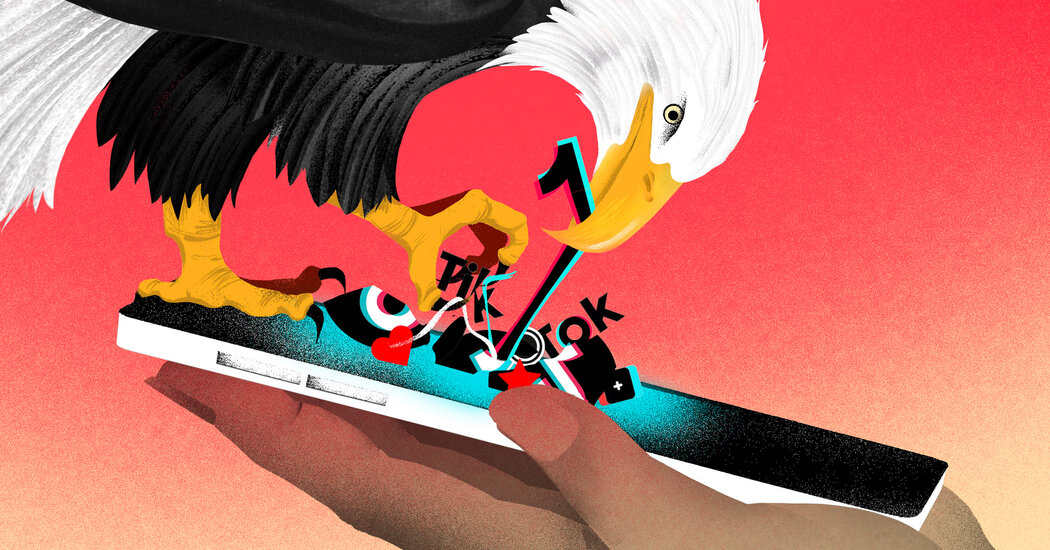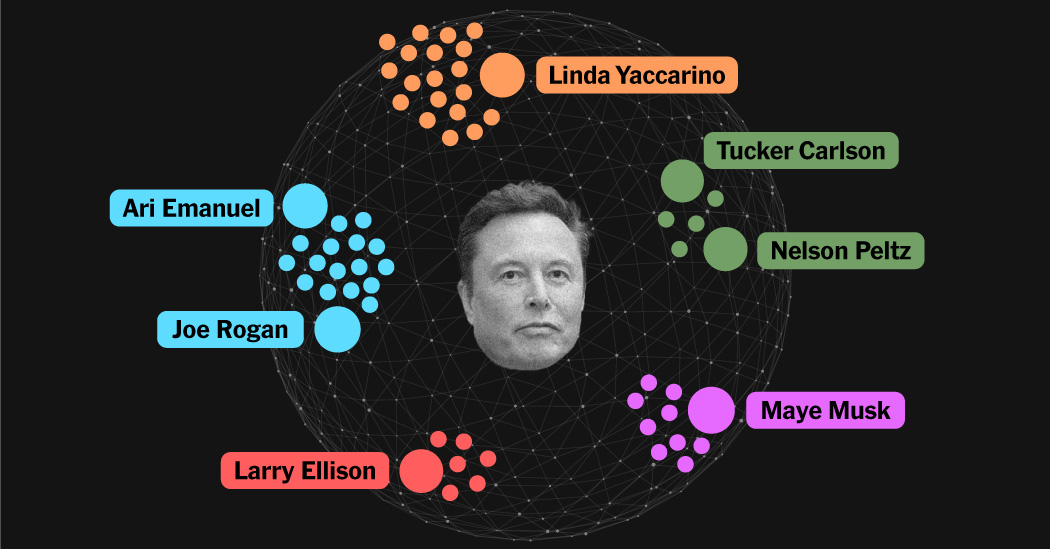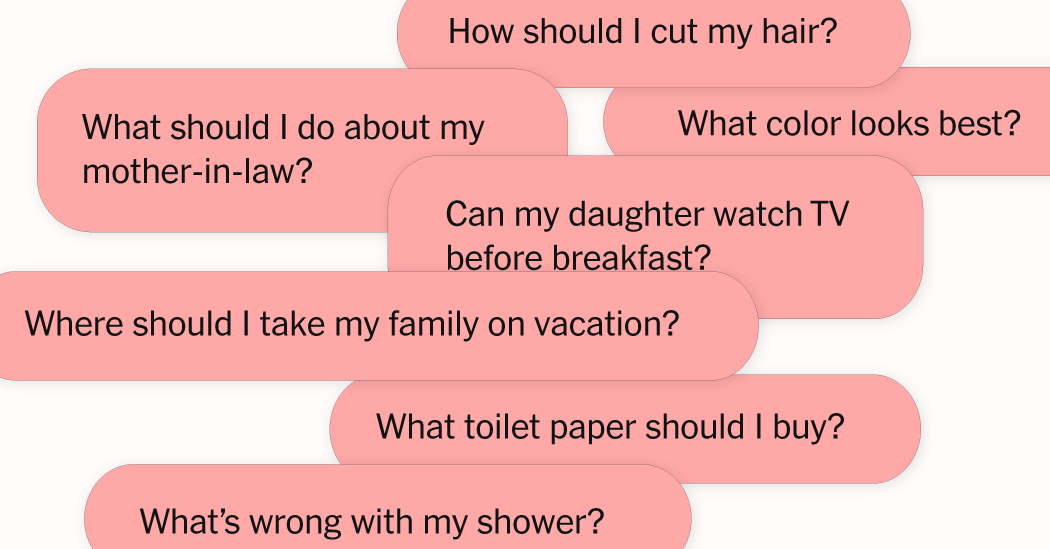For decades, the United States has fashioned itself the champion of an open internet, arguing that the web should be largely unregulated and that digital data should flow around the globe unhindered by borders. The government has argued against internet censorship abroad and even funded software that lets people in autocratic states get around online content restrictions.
Now that reputation could take a hit.
The House is expected to again try to advance legislation to force a sale of TikTok by its Chinese owner, ByteDance, or institute a first-of-its-kind ban on the app in the United States, this time including it in an aid package for Israel and Ukraine. It is expected to be similar to a stand-alone measure that passed the House last month with bipartisan support, the most significant step yet by Congress to force the sale of a foreign-owned app of TikTok’s size.
Digital rights groups and others around the world have taken notice — and raised the question of how the moves against TikTok contradict the United States’ arguments in favor of an open internet.
A Russian opposition blogger, Aleksandr Gorbunov, posted on social media last month that Russia could use the move to shut down services like YouTube. And digital rights advocates globally are expressing fears of a ripple effect, with the United States providing cover for authoritarians who want to censor the internet.
In March, the Chinese government, which controls its country’s internet, said America had “one way of saying and doing things about the United States, and another way of saying and doing things about other countries,” citing the TikTok legislation.
By targeting TikTok — a social media platform with 170 million U.S. users, many of them sharing dance moves, opining on politics and selling wares — the United States may undermine its decades-long efforts to promote an open and free internet governed by international organizations, not individual countries, digital rights advocates said. The web in recent years has fragmented as authoritarian governments in China and Russia increasingly encroach on their citizens’ internet access.
“It would diminish the U.S.’s standing in promoting internet freedom,” said Juan Carlos Lara, the executive director of Derechos Digitales, a Latin American digital rights group based in Chile. “It would definitely not bolster its own case for promoting a free and secure, stable and interoperable internet.”
The American vision for an open internet dates to the 1990s when President Bill Clinton said the internet should be a “global free-trade zone.” Administrations — including the Biden White House — have struck deals to keep data flowing between the United States and Europe. And the State Department has condemned censorship, including Nigeria’s and Pakistan’s restrictions on access to Twitter, now known as X.
Now, fueled by concerns that TikTok could send data to the Chinese government or act as a conduit for Beijing’s propaganda, the legislation that passed the House last month would require ByteDance to sell TikTok to a buyer that satisfied the U.S. government within six months. If the company doesn’t find a buyer, app stores must stop offering the app for downloads, and web hosting companies couldn’t host TikTok. (It remains to be seen if the version of the measure likely to appear alongside the aid package will include changes to the deadline or other facets of the bill.)
The passage of the House bill in March, currently under consideration in the Senate, prompted global angst.
Mr. Gorbunov, a Russian blogger who goes by the handle Stalin_Gulag, wrote on the social media service Telegram in March that a TikTok ban could result in further censorship in his country.
“I don’t think the obvious thing needs to be stated out loud, which is that when Russia blocks YouTube, they’ll justify it with precisely this decision of the United States,” Mr. Gorbunov said.
Mishi Choudhary, a lawyer who founded the New Delhi-based Software Freedom Law Center, said the Indian government would also use a U.S. ban to justify further crackdowns. It has already engaged in internet shutdowns, she said, and it banned TikTok in 2020 over border conflicts with China.
“This gives them good reason to find confidence in their past actions, but also emboldens them to take similar future actions,” she said in an interview.
Mr. Lara of Derechos Digitales noted that countries like Venezuela and Nicaragua had already passed laws that gave the government more control over online content. He said increased government control of the internet was a “tempting idea” that “really risks materializing if such a thing is seen in places like the U.S.”
A forced sale or ban of TikTok could also make it harder for the American government to ask other countries to embrace an internet governed by international organizations, digital rights experts said.
China in particular has built a system of internet censorship, arguing that individual countries should have more power to set the rules of the web. Beijing blocks access to products made by American tech giants, including Google’s search engine, Facebook and Instagram.
Other countries have followed Beijing’s lead. Russia blocks online content. India and Turkey have measures enabling them to demand that social media posts be removed.
Patrick Toomey, the deputy director of the National Security Project at the American Civil Liberties Union, said that if the TikTok measure became law, the “hypocrisy would be inescapable and the dividends to China enormous.” The A.C.L.U. has been one of the most prominent groups opposing the TikTok legislation.
Any U.S. TikTok ban or sale would require officials to explain why the measure was different from efforts in other countries to restrict the flow of digital data inside their borders, said Peter Harrell, previously the National Security Council’s senior director for international economics and competitiveness in the Biden administration. The United States has pushed for data to be able to flow between countries unhindered.
“I’m in favor of action on TikTok here, but we are going to have to scramble to play catch-up on the diplomatic front,” Mr. Harrell said.
Still, other supporters of the legislation rejected the notion that action against TikTok would undermine the United States on internet policy.
An aide to the House Select Committee on the Chinese Communist Party, who was not authorized to discuss the legislation publicly, argued that the measure would benefit internet freedom by reducing the risk of China’s influence over TikTok.
In a statement, a spokesman for the National Security Council said the United States “remains committed to an open internet.”
“There is no tension between that commitment and our responsibility to safeguard our national security by preventing the specific threats posed by certain adversaries being able to put at risk Americans’ personal information and manipulate Americans’ discourse,” the spokesman added.
Anton Troianovski contributed reporting from Berlin; and Meaghan Tobin contributed reporting from Taipei, Taiwan.







